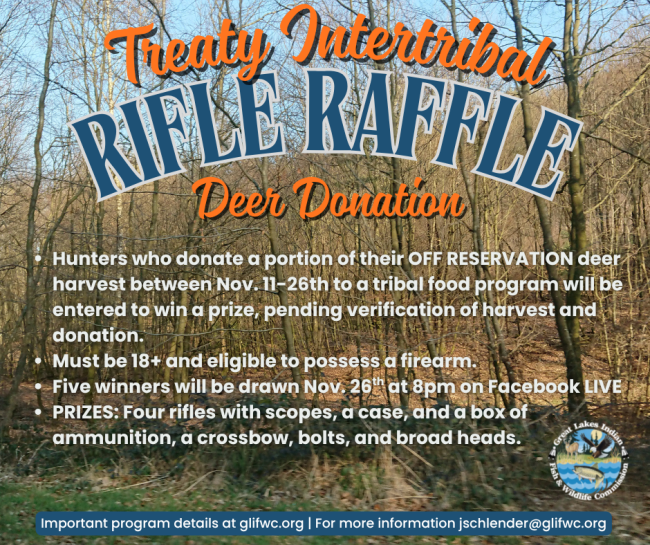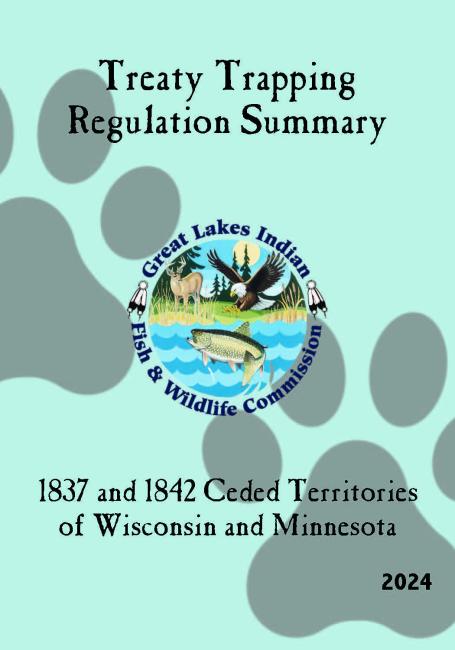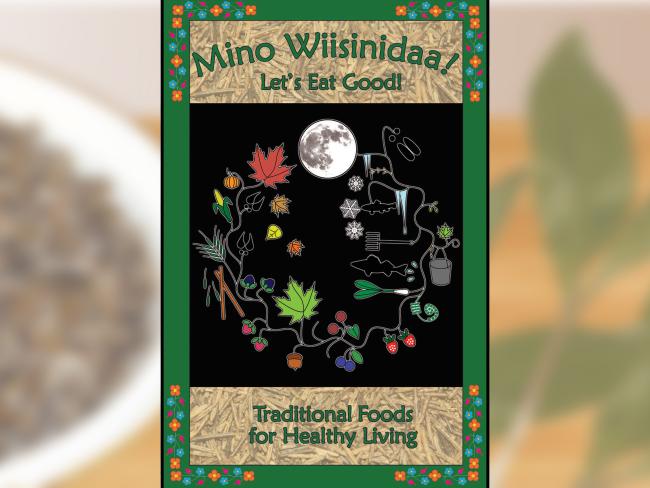Many of GLIFWC’s member tribes have been notified that the benefits of their SNAP programs are set to be delayed or expire beginning November 1. The federal Supplemental Nutrition Assistance Program, or SNAP, is a potential casualty of the ongoing government shutdown that is impacting all citizens across the country and especially in tribal communities.
GLIFWC encourages all tribal harvesters to consider donating to tribal programs and entities as a way to offset any impact to elders and vulnerable families.
Currently some tribes are coordinating group hunts focused on elders and tribal youth. The time is right to harvest deer, setting nets is another viable option on many productive Ceded Territory waters, and sharing harvested manoomin as well.
You’ll find a complete list of tribal programs and contact information. Please utilize this information as it’s important to assess storage and processing capacity for each tribe.
- We're encouraging those who are able to help their communities prepare for gaps in food security by harvesting traditional foods.
- We're actively working to update our list of contacts to get harvesters connected with processors who can help get your harvest prepared for distribution and storage.
- We're actively updating our list of available coolers, freezers and places where food can be donated and safely stored.
Please reach out to the following contacts with questions and any support you can.
Chi miigwech! Weweni sa go (in a good way)

Where: 1836, 1837, 1842 and 1854 Ojibwe ceded territories
When: November 11th – November 26th, 2025
Drawings will be held November 26th, 2025, on Facebook Live.
Eligible winners must have verification of harvest and donation to a tribal food program in order to receive a raffle form.
- 18+ to enter the drawing
- Must be eligible to possess a firearm
- Raffle ticket forms must be submitted to GLIFWC by November 26, 2025 by 4pm (Central Standard Time)
Process:
Tribal hunters must obtain off-reservation harvest permits from their respective tribe and harvest deer under their tribe’s off-reservation conservation code.
Tribal hunters must register deer at the Tribal Registration Station or through the online NAGFA system.
Tribal hunters must deliver registered donated deer to the designated tribal location and fill out the following for each deer donated:
Raffle ticket form recording the raffle ticket number, contact information: hunter’s name, address, and phone number, NAGFA ID number, deer harvest management unit, and date the donated deer was processed.
Tribal hunters submit form to GLIFWC
- The designated processor will process and distribute the venison to tribal programs and
save heads for CWD testing. - GLIFWC will then confirm off-reservation deer donated to the program were legally
harvested and registered and submit the accompanying raffle ticket for the prize drawing. The greater the number of deer donated to community food programs the greater the number of raffle tickets a hunter would be issued for the prize drawing.
Prizes: 4 rifles with scopes, cases, and ammunition
- Rifle 1: Tikka X3 7mm 08
- Rifle 2: Savage 7mm08
- Rifle 3: Howa 270 win
- Rifle 4: Mossberg .308 win
- Crossbow: Ravin R10
- Vortex Crossfire HD scope 3-9x40
- Two boxes of 7mm 08 ammunition lead free
- One box of .270-win ammunition lead free
- One box of 308-win ammunition, lead free
- One box Ravin lighted carbon arrows
- One Rage trypan no collar broadheads
Contact your Voigt Intertribal Taskforce Representative, GLIFWC Commissioner, or tribal harvest contact listed below for raffle forms:
Bad River: Rae Ann Maday
Bay Mills Indian Community: Whitney Gravelle
Fond Du Lac: Reggie Defoe and Thomas Howes
Keweenaw Bay Indian Community: Rodney Loonsfoot and Chris Swartz
Lac Courte Oreilles: Janet Quaderer and Jordan St Germaine
Lac Du Flambeau: Gerry Mann and Lyle Chapman
Lac Vieux Desert: Alan Shively
Mille Lacs: Jordan Williams
Mole Lake: Leelyn Van Zile, Josh Van Zile, and Wayne LaBine
Red Cliff: Mark Duffy
St Croix: Conrad St. John
For more information and full program details please contact jschlender@glifwc.org
Good luck to everyone and be safe out there! chi miigwech
Additional contact information for Jason Schlender
SNAP/Social & Family Services | Wendy Corbine | (715)-682-7127 |
| Bay Mills | Connie Watson | (906)-248-8363 |
Maria Defoe (218)-878-8006 | Thomas Howes (218)-591-2687 | Reg Defoe (218)-878-7100 |
| KBIC | Sue Ellen Elmblad | (906)-353-6096 |
| LCO | Mary Wolf | (715)-957-0027 |
LdF Food Distribution | Anna Borchard | (715)-588-4384 |
Conservation Committee | Alan Shively | (906)-250-8139 |
| Mille Lacs | Jeffrey Aubele | (320)-532-7880 |
Food Shelf & Food Pantry | Butch Bresette | (715)779-3740 |
| St. Croix | Chris Staples | (715)-791-4322 |
Food Distribution | James Polar | (715)-478-7546 |
The sweet taste of success
A renowned chef reveals the secrets of preparing perfect venison—no matter what the cut.
Hunters can help Wisconsinites in need by donating deer harvested in Wisconsin through the DNR's deer donation program. Venison from donated deer is processed and distributed to food pantries across the state.
Bad River tribal members are welcome to reserve time at the Fish House to process their harvests every Friday-Saturday. Call Linton for more information: 715-979-1010 at 65239 US HWY 2 Ashland, Wis.

You are responsible for knowing your Tribe’s regulations, which are subject to change and may be more restrictive. These pages summarize regulations that will be enforced in tribal court(s); they do not summarize local, state, or federal criminal laws related to the use or possession of firearms that may be enforced in other courts. Check with your Tribe or GLIFWC with questions.
Permits are available online for camping, gathering, ricing, and game harvesting (deer, bear, small game, turkey, and migratory bird) during and approximately 2 weeks prior to their season opening dates. If you already have a NAGFA account set up, you can issue your own permits. Detailed instructions for issuing permits online can be found here. If you have not previously been issued an off-reservation permit, you will need to contact your registration station or conservation law enforcement office to set up an account.
In addition to harvest permits, carcass tags are required when harvesting elk, bobcat, otter, and fisher in Wisconsin. Carcass tags can be obtained from your tribal registration station or from GLIFWC.

Venison with Onions and Balsamic Vinegar
1 to 1 1/2 pounds trimmed loin or rump steak (can be in several pieces)
Salt and pepper
3 tablespoons clarified butter or light cooking oil
1 to 1-1/2 cups thinly sliced red or yellow onion
1/4 cup balsamic vinegar
1/2 cup beef stock or water
4 tablespoons whole, cold butter
1. In a frying pan, heat 2 tablespoons clarified butter or oil over high heat. Meanwhile, lightly season all sides of meat with salt and pepper.
2. Add meat to pan and brown on all sides, 1 to 3 minutes depending on size of pieces. Cook meat in separate batches if necessary to avoid crowding in pan. Remove meat to a cutting board.
3. Add remaining 1 tablespoon clarified butter or oil to pan and sauté onions until nicely browned.
4. Add vinegar and cook until pan is dry. Add stock or water and bring to a boil, stirring to scrape glaze from pan bottom. To this sauce add a pinch of salt and pepper.
5. Add 2 tablespoons cold butter to sauce and whisk in. Remove from heat and whisk in remaining butter.
6. Slice meat thinly (1/6-inch) across the grain. Place slices on plates and pour sauce around. Serve with wild rice and a cooked vegetable, such as carrots. Serves four.
Venison Swiss Steak
1 1/2 to 2 pounds trimmed round or chuck steak (cut into 3/4-inch-thick slices)
Salt and pepper
1 1/2 cups all-purpose flour
3 tablespoons clarified butter or light cooking oil
1 1/2 cups thinly sliced red or yellow onion
2 tablespoons tomato paste or 1 cup tomato puree
1 1/2 cups beef stock or broth. Enough water to cover
1. Preheat oven to 300 F.
2. Mix salt and pepper into flour. Dredge meat in flour to coat well. Shake off excess.
3. At high setting, heat 2 tablespoons clarified butter or oil in a large fry pan or low-sided, flat-bottomed casserole.
4. When the butter or oil is very hot but not smoking, add meat and brown on all sides (roughly 2 minutes). Cook meat in separate batches if necessary to avoid crowding in pan. Remove meat from pan and set aside.
5. Add remaining butter or oil and sauté onions.
6. Stir in tomato paste or puree, stock or broth, and pinch of salt and pepper. Add steaks and position in a single layer. Cover with water.
7. Bring to a boil, cover tightly, and bake in oven for 2 1/2 hours.
8. Remove from oven. Place steaks on plates. Serve with mashed potatoes. Pour sauce from pan over everything. Serves four.
Venison Stroganoff
1 1/2 pounds trimmed chuck, cut into 3/4-inch cubes
Salt and pepper
1 1/2 cups all-purpose flour
3 tablespoons clarified butter or light cooking oil
3/4 cup thinly sliced red or yellow onion
1 1/2 cups sliced mushrooms
1 tablespoon tomato paste or 1/2 cup tomato puree
1 1/2 cups beef stock or broth
Enough water to cover
3 tablespoons sour cream
2 tablespoons whole butter
1 tablespoon finely chopped parsley (optional)
Follow steps 1-4 of Venison Swiss Steak recipe.
5. Add remaining butter or oil and sauté onions 1 to 2 minutes until just softened.
6. Stir in mushrooms and cook 1 to 2 minutes. Stir in tomato paste or puree, stock or broth, and pinch of salt and pepper. Add meat. Cover with water.
7. Bring to a boil, cover tightly, and bake in oven for 21/2 hours.
8. Remove from oven. Stir in sour cream and whole butter. Serve over egg noodles, mashed potatoes, or homemade croutons. Sprinkle with parsley. Serves four.